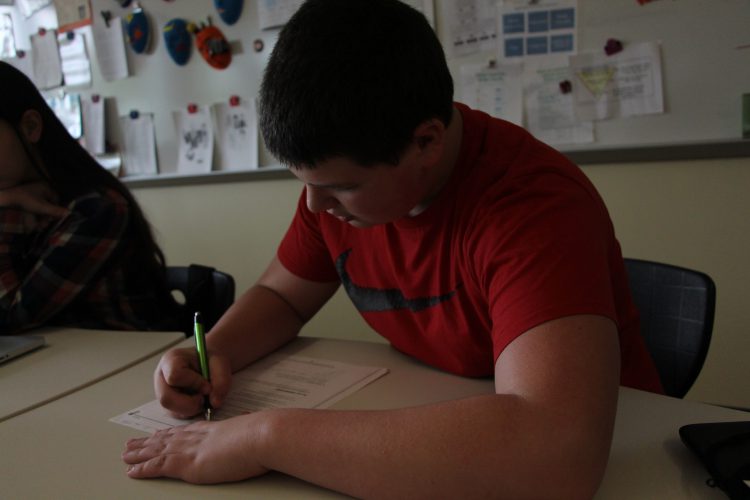Written by Logan Cummings|
Photos by Logan Cummings|
The school day ends at 2:10 pm. The ideal bedtime is around 10:00 pm. That leaves 7 hours and 50 minutes to enjoy the afternoon and night. That’s a lot of free time, right? Wrong. Students don’t get enough downtime after school because with extracurriculars and homework the time seems to disappear.
Extracurriculars are done for fun and by choice; students aren’t obligated to participate in clubs or sports. However, homework is not a voluntary obligation. Students are required to do homework, a time-consuming and dreadful job, in order to maintain their grades.

Of 121 students surveyed, about 53% of them take 3 or more honors/AP classes. As you may know, such classes rear more homework with harder content. That causes an increase of time it takes to complete the homework and makes it all the more dreadful.
Additionally, about 29% of students receive two hours of homework, and 47% of students receive three or more hours of homework on a daily basis.
Because of this amount of homework, students lose free time. Not only do they lose that, but they also lose sleep. Students find themselves not getting enough sleep because they receive so much homework and tend to work on it at night.
 Assistant Principal Tyler Webb sent out a survey to the students and another one to the teachers. The email read, “Over the course of the last three months the Board of Education has held meetings with students, parents, teachers, and administrators, to discuss the topic of homework.”
Assistant Principal Tyler Webb sent out a survey to the students and another one to the teachers. The email read, “Over the course of the last three months the Board of Education has held meetings with students, parents, teachers, and administrators, to discuss the topic of homework.”
On the topic of Homework, Mr. Webb believes that “teachers always need to be cognizant of the purpose of the homework.” Paraphrasing Mr. Webb, “the purpose” of the homework is for practice and understanding the content being taught. If teachers understand the main purpose of the homework, they would assign a fair amount.
According to Stanford Research, homework is a primary stressor to students. Mr. Webb claimed that “stress is not a bad thing, per say.” He thinks that there is good stress and bad stress that can be created by homework. The good stress acts as a motivation for students, thinking that they are obligated to complete their work, by compelling them to practice and learn the material on their own time. The bad stress would be the kind of stress that makes students feel helpless and uncomfortable.
Mr. Webb believes that “it is important that we don’t isolate [stress] as just homework.” He thinks various kinds of stress are attributed to the common issues students deal with. These stresses include home, social, and extracurricular stress. Mr. Webb also attributed stress from pressure put on students by peers, family, and themselves.
 The amount of homework teachers assign is not a problem to Mr. Webb. He thinks that homework would take 1-2 hours on average, with some students receiving very little and honors students likely getting on the high side of the range or even more.
The amount of homework teachers assign is not a problem to Mr. Webb. He thinks that homework would take 1-2 hours on average, with some students receiving very little and honors students likely getting on the high side of the range or even more.
What are the pros of getting less homework? Freshman Joshua Kennedy claimed, “more people would probably get more sleep.” Sophomore Olivia Morrissey said there would be “more time to do other…activities such as clubs and sports.”
What are the cons of getting less homework? Olivia referenced study guides, saying, “those are very important for tests and quizzes.” Sophomore Melanie Coretti said that less homework would mean “less of a reinforcement of what we learned that day.” Senior Cedar Hittle commented, “I can’t think of any cons; it’s all terrible!”
Will the amount of homework be changed? Or will the teachers continue to assign the same amount as usual? All we can be certain of is that students are at a loss of sleep and free time due to the amount of homework they receive.


